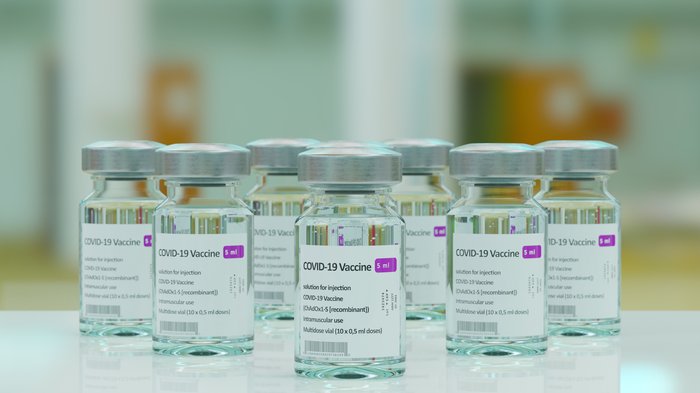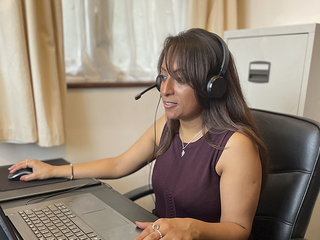How our research gave vaccine answers to people with blood cancer
As our QResearch project formally comes to a close, we look at how scientists were able to understand the effectiveness of the COVID-19 vaccine for clinically extremely vulnerable people during the pandemic.

Photo credit to Braňo on Unsplash
With the winter approaching, the spotlight on COVID-19 is seemingly intensifying. But for many of our community, COVID-19 and uncertainty around the virus has never really gone away.
Lymphoma, myeloma and leukaemia are all forms of blood cancer. Because of the nature of these diseases and the available treatments, many people living with blood cancer have weakened immune systems. This can make them more prone to serious illness with COVID-19.
But during the pandemic we didn’t know whether having a weakened immune system also meant that some people wouldn’t generate a ‘good response’ to the COVID-19 vaccines.
So, we reacted swiftly to get answers. Our community needed them, and fast.
We formed the Blood Cancer UK Vaccine Research Collaborative and invested £2 million in vaccine research, covering all major blood cancer types.
One of these studies – which used the nationally representative QResearch database – is now complete. It looked at the impact of vaccines in people with blood cancer who weren’t included in the initial vaccine trials. This research was conducted when only 4 vaccine doses had been offered, and it has given us a significantly better understanding of COVID-19 immunity in people with blood cancer. We caught up with the scientists to learn about what they found.
What did the QResearch team do?
Professor Julia Hippisley-Cox and her team at the University of Oxford carried out the work to look at the safety and effectiveness of the COVID-19 vaccines based on anonymised patient data records.
Prof Hippisley-Cox said: “We wanted stronger evidence to provide clarity to people living with blood cancer and their clinical teams on how safe and effective COVID-19 vaccines are for them, and how to safely care for them as COVID-19 continues to circulate.”
“We also wanted to understand whether certain treatments could lead to a more or less severe COVID-19 illness.”
The study:
Using the largest database of its kind – consisting of anonymised GP patient data from 45 million people in the UK – Professor Julia Hippisley-Cox asked:
- What are the risks of severe side effects associated with COVID-19 vaccinations in people with blood disorders?
- How effective are COVID-19 vaccines in reducing the risk of people with blood cancers being hospitalised, admitted to intensive care, or dying from COVID-19?
- Are these risks different for people with different types of blood cancer – leukaemia, myeloma, lymphoma to name three – and types of treatment?
So, how effective are COVID-19 vaccines in reducing the risk of people with blood cancers being hospitalised, admitted to intensive care, or dying from COVID-19?
Lead author, Dr Jennifer Hirst explains: “The research found that one to four doses of any COVID-19 vaccine were effective in protecting people with blood cancer from dying or being hospitalised with COVID-19.
“People with blood cancer were also over 80% less likely to die with COVID-19 in the 2 to 6 weeks following a second, third and fourth vaccine dose compared to people with blood cancer who did not receive any COVID-19 vaccines.
“And our work found that while COVID-19 vaccines didn't work as well at preventing people with blood cancer from being admitted to hospital after having COVID-19 as they did in people without blood cancer, they provided similar levels of protection against dying from COVID-19 in both groups.”
Are these risks different for people with different types of blood cancer (such as leukaemia) and types of treatment (such as chemotherapy)?
“People who had recently been on chemotherapy (within the last 6 months) were less protected against being admitted to hospital after having COVID-19 after vaccination, but received a similar level of protection against dying from COVID-19 when compared to people who had not received chemotherapy recently (or ever).
“And our research found that vaccine effectiveness was similar between people with B-cell lymphoma and people with other types of blood cancer."
What are the risks of severe side effects associated with COVID-19 vaccinations like blood clots in people with blood disorders?
Professor Hippisley-Cox said: “In the month following a first, second or third dose of any COVID-19 vaccine, people with blood cancer were not at higher risk of experiencing a range of side effects compared to the general population, including blood clots and immune-related conditions.“
What does this mean going forward?
The work itself provides good evidence that people with blood cancer should continue to receive booster doses when offered.
It also suggests that those with blood cancer should be prioritised for booster doses to maintain vaccine effectiveness.
We also think that it means that existing policies, communication on, and delivery of, COVID-19 vaccines to people with blood cancers must be improved to ensure equitable uptake in the future.
Lastly, it shows that the research supporters like you help us fund, delivers the answers that our community needs.
How you can help prepare against future pandemics
The UK and Scottish governments are running public inquiries into their responses to and the impact of the COVID-19 pandemic. Both intend to make recommendations to support future pandemic preparedness. Everyone is invited to share their experience of the pandemic with the inquiries through listening projects.
If you’re in England, Wales or Northern Ireland, find out more and share your story here: https://covid19.public-inquiry.uk/every-story-matters/
If you’re from Scotland you can share your story here: https://lbh.covid19inquiry.scot/share-your-experiences

Worried about anything or have questions?
If you need someone to talk to, please don't hesitate to contact our Support Service by phone or email.
